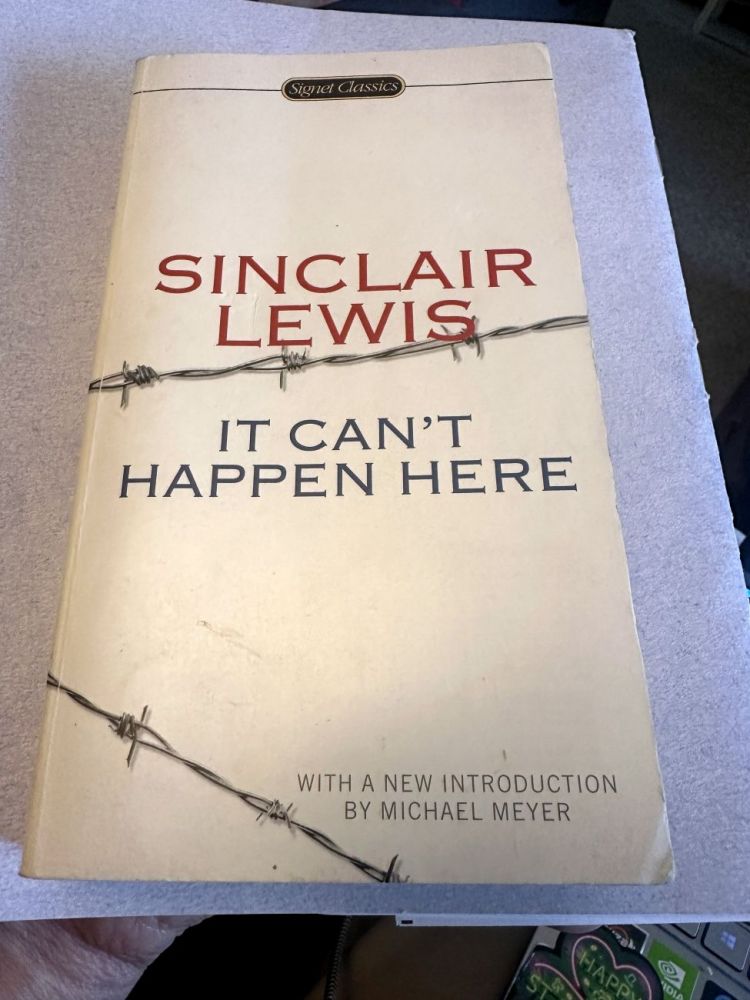Kirby Neumann-Rea: Should we not ask if fascism could, indeed, happen here?




About the writer: Longtime Oregon journalist Kirby Neumann-Rea retired earlier this year as managing editor of the News-Register. But he keeps his fingers nimble on the keyboard, his mind nimble at the library and his legs nimble on the basketball court. He posted a longer version of this column on his subscription-free Substack.com newsletter, “Burn the Ax Handle.”
On a McMinnville side street, I recently found one of those little libraries — free private “take one or leave one” neighborhood collections.
Little libraries are not unusual these days, but this one bore an elegantly-lettered sign: “Catch & Release Books.” I liked how the fishing philosophy was applied to the enjoyment of reading, so I got out and had a look at the books.
That led to a discovery: Sinclair Lewis’ 1935 book, “It Can’t Happen Here.”
In its pages, businessman Francis Tasborough counters the title by proclaiming, “Nonsense! Nonsense! That couldn’t happen here in America, not possibly! We’re a country of freemen!” But how sure can we be of that, Lewis asks.
I’d heard of the book, but had not read it. I soon learned its 90-year echoes ring pretty clear – uncannily so.
Reading the tale of journalist and revolutionary Doremus Jessup’s travails against the tyranny and perfidy of Presidents Buzz Windrip, Lee Sarason and Dewey Haik, it’s almost as if Lewis foresaw Donald Trump.
In light of this, I wonder now why more is not being written this year about “It Can’t Happen Here,” for it feels as relevant today as it did when published on the heels of the Great Depression.
The book resonates because it closely matches the troubling drama of our times: The failure of the GOP is the critical point of collapse in the great giving-way to the greedy demagogue known as Donald Trump and his MAGA movement.
Lewis’ book is a vision of USA-bred fascism taking power. But the underpinning shared by the novel and the reality we are seeing now in our country is this: the breakdown of the traditional form of government, which, warts and all, has served us well for 250 years.
If Sinclair Lewis were writing his tale not as a cautionary, but in response to Trump, he could not have pegged it better to current events than the oppressive Corpos, the venal actuaries of Windrip who carry out censorship, intimidation, arrests and incarcerations. (Murder, too, in the novel: One can apply their own comparisons to events in the recent past in Minnesota and Utah.)
Charlie Warzel recently wrote in The Atlantic:
“Trump’s callousness, indifference and corruption alter the very texture of our shared reality. They drag us all into a world of his making.”
Ninety years on, Lewis’s book feels eerily prescient:
- “Sarason was eager for war with Mexico, Ethiopia or Siam or Greenland, or any other country … “
- “Windrip … after 18 months of presidency was angry that Mexico and Canada and South America (obviously his own property by manifest destiny) should curtly answer his curt diplomatic notes and show no helpfulness about becoming part of his inevitable empire.”
- “Senator Windrip has got an excellent chance to be elected, and if he is, probably his gang of buzzards will get us into some war, just to grease his insane vanity and show the world that we’re the huskiest nation going.”
Disturbing current events just underscored all of this, with Trump’s remark, “Take that, Tehran,” and his joke about a vain and ill-tempered “Bomb Iran” video.
If not “huskiest” nation, how about “hottest”? Something’s ringing here, but it does not sound like the Liberty Bell.
Politico Magazine writer Joshua Zeitz interviewed Daniel Steinmetz-Jenkins, a historian at Wesleyan University who edited a volume of essays by leading students of fascism, past and present, including one invoking Lewis’s 1935 book.
Zeitz notes, “Did It Happen Here? Perspectives on Fascism and America lays bare fascism’s slippery nature as a term and a concept, and the perils of applying it to one’s political opponents. But it also identifies themes that might strike many Americans as uncomfortably close to home: illiberalism, hyper masculinity, blood and soil nationalism, a love of strongmen and state power – and politics driven by grievance and anger.”
Steinmetz-Jenkins states, “When we put it in a historical context, and then we look at it in that light, we then have to say to ourselves, ‘OK, well, what is it about the context today that shares something from that previous context, in terms of how we understand fascism back then?’ And that’s where there’s a major debate, right? ...
“But I think this so-called fascism debate centers on this very issue. How much do we need to be replicating the past in order to call what we’re seeing today fascist? Or do we need to do that at all? Can we just say, well, there is a timeless essence that can be downloaded on any period, and that’s what we’re seeing right now.”
With mass arrests and deportations, cutting of programs vital for the underserved, indiscriminate budget cuts, willful compromising of checks and balances, and actions such as dismantling DEI programs, are we seeing anything other than “the will to power would be another thing, emphasizing strength and might over reason,” as Steinmetz-Jenkins puts it?
He avers that Trump may not be an imperialist — his designs on Greenland, Canada and other places notwithstanding. But could it be Trump is an imperialist of ego and ideology rather than territory when he declares, “I am in charge of the world?”
The quote, “When fascism comes to America, it will be wrapped in the flag and carrying the cross,” has been, by all accounts, inaccurately attributed to Sinclair Lewis. Its source remains unverified.
Yet Lewis said similar things, including one from “It Can’t Happen Here.”
He noted, “Every man is a king as long as he has someone to look down on.” And he said, “That eternal enemy: the conservative manipulators of privilege who damn as ‘dangerous agitators’ any man who menaces their fortunes …”
The theme of fascism and craven behavior under the guise of governance was not limited to “It Can’t Happen Here” among Lewis’ works, but it is there that one of Windrip’s cronies is liquidated, a henchman quipping, “A dangerous man. Always talking about Lincoln.”
The story ends with an edge befitting 2025. It features Jessup musing, “More and more, as I think about history, I am convinced that everything that is worthwhile in this world has been accomplished by the free, inquiring, critical spirit, and that the preservation of this spirit is more important than any social system whatsoever. But the men of ritual and the men of barbarism are capable of shutting up the men of science and of silencing them forever.”
So long live little libraries, those bastions of liberty, whose doors are small but powerful.









Comments
mikes
I have been moving "It Can't Happen Here" for years and finally decided to put it in our little library. That you found it and Lewis spoke to you, and you being you, spread the truth of what Lewis was saying about today's dangers, is one of life's fortunate coincidences. Thank you.
mikes
Kirby, I also put some books about hypnotism in our little library. You'd be surprised how little it takes for a suggestion to sneak in and begin to control. Another major danger of our times is our love of these internet devises. And its big beautiful ability to give us suggestions.
Judy
It's here!
fiddler
Everything is blamed on Trump, and maybe it's appropriate because he's responsible. However, it was Wilson who separated families at the border during Trump's first term and it's Wilson who is driving all the antisocial policies in Trump's second term. Wilson has carte blanche, no restrictions. Trump is playing golf and signing everything his advisers put in front of him (I doubt he reads anything), then he has a speech writer tell him what to say.
Bottom like: it's more complicated than just "Trump is the problem."
Otis
If it can happen in Germany, it can happen anywhere. They just built a FEMA funded concentration camp in FLA, so yeah....it's here.
Judy
Fascisim is already happening here!